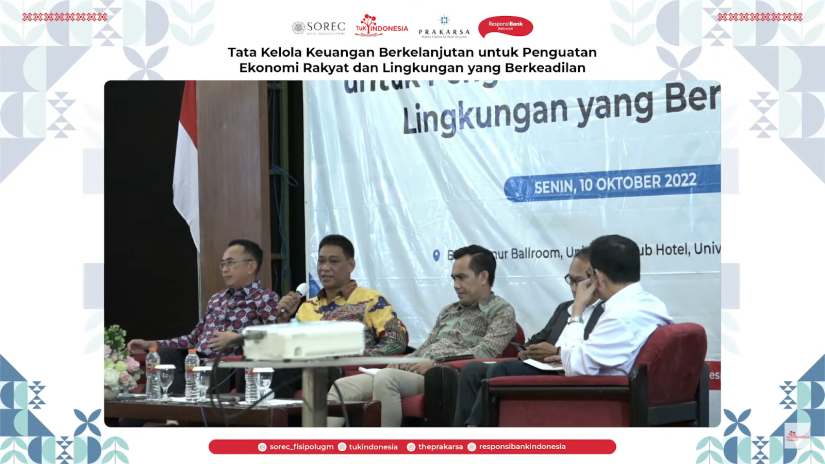
Yogyakarta, October 10th 2022 – Social Research Centre (SOREC) Fisipol UGM collaborated with TuK Indonesia, The Prakarsa, and Responsibank Indonesia in holding a seminar titled “Sustainable Financial Management to Strengthen the People’s Economy and Just Environment” on Monday (10/9) in UGM’s University Club. There were 13 speakers invited to the event such as Dr. Yulius MA as the Deputy of Micro Enterprises Ministry of Cooperatives and SMEs; Ah Maftuchan as the Coalition Director of Responsibank Indonesia; and Arie Sujito as the Vice Rector of UGM.
“This seminar is very relevant in our progress towards sustainable growth,” said Yulius to open up the seminar. It becomes more relevant when we take into account the crisis threat predicted to come in 2023. That is why we need sustainable financial management to face the upcoming threat.
“Sustainable finance in a business does not only produce, it also contributes in creating a better social condition and a better environment,” said Ah Maftuchan, to reiterate Yulius’s statement.
In line with what Yulius and Ah Maftuchan said, according to Arie, sustainable finance is healthy management that is both independent and accountable. “It does not only answer technical problems, it is also a meaningful management system,” Aerie said. According to him, sustainable financial management can become the basis of the people’s economy, a discourse that is often excluded in the midst of the neoliberal wave.
Still relevant to what Arie said, the seminar is then followed by the first session titled “Balancing the Supporting Role of Banking between High-Risk Industries and the People’s Economy”. Right now, the contribution of Micro, Small, and Medium Enterprises (MSMEs) toward the Indonesian economy is smaller compared to big enterprises. This is because the average credit given by banks and financial institutions to MSMEs is only 27%. Meanwhile, big enterprises get 62%.
According to Bustar Maltar, the founder of Kobumi, minimal access to MSMEs is due to the lack of guarantee that MSMEs can make. “If MSMEs can’t give a smooth cash flow, we can’t give them significant funding,” she said. Interestingly, John Sarjono, the Regional CEO of BRI RO Yogyakarta, said that the BRI gives 86% of their credits to MSMEs. “The government through the Ministry of State-Owned Enterprises ruled that 80% of BRI’s credit portfolio in 2022 needs to go to MSMEs, and by 2025 it needs to be 85%,” said John.

According to Edi Sutrisno, the Executive Director of TuK Indonesia, in the last 5 years, there are 56 billion US dollars given to palm oil and mining industries with 37% of creditors coming from Indonesia. “Ironically, these funded enterprises have a lasting impact socially and environmentally,” Edi said. According to him, one of the principles of sustainable finance, which is to be responsible, is not implemented. This is shown through the fact that there are many state expenses that need to be dedicated to managing the impact of the operational side of the industry, such as in the form of dealing with the forest fire in Kalimantan in 2019.
The seminar then continued with the second session with five speakers under the title of “Strengthening The People’s Economy and Creating a Just Environment”.
